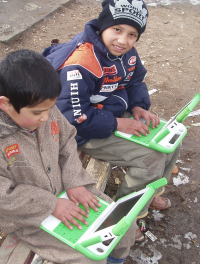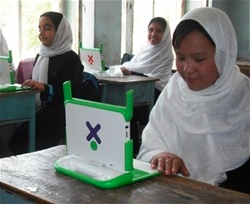It is well established that Education is one of the most important aspects of human development and a key contributor to stability. In Afghanistan however, although relatively rapid progress has been made in the education sector, just over half (52%) of primary school aged children are enrolled in school.
Furthermore, due to insufficient school buildings and teachers, which forces some schools to run up to three shifts per day, and to place over 50 children in some classes, each child generally receives only 2.5 hrs (5 x 30min periods) of school a day.
Research widely concludes that amongst the most important variables in the quality of education are: the amount of time students are exposed to curriculum (Time on Task); structured Feedback provided through marked homework assignments, quizzes and tests; and, access to information resources and facilities generally found in school libraries.

Afghans learning with XO's
For the 48% of children outside of the mainstream education system currently growing up illiterate there have been initiatives known as "Community Based Education" supporting any available literate or semi-literate members of the community to provide education for the children of other community members whose parents are likely illiterate.
OLPC addresses:
- Time on Task: Afghan children receive approximately half the developed nations (OECD) average time on task to cover their curriculum in mainstream schools. In community based education scenarios the same time is alloted however more time is often needed for basic checks on students (health and welfare) thus depleting time for curriculum learning.
- Feedback: Whereas OECD teachers typically spend 15 hours/week providing structured feedback to students, Afghan teachers have no such allotted time; consequently there is little if any way to verify student understanding of the curriculum. The fact that most parents are illiterate, so cannot provide educational support to their children at home, is another major constraint to the improvement of Afghan education. Community based teachers may not even be able to check or work out answers themselves leaving them unable to provide help and feedback in many instances.
- Library Resources: Afghan schools have insufficient library resources for the children that they teach, providing little opportunity to widen their horizons and nurture their intellectual potential.
The ultimate measure of success in any education system is the production of more highly educated graduates who become a more capable and relevant workforce. That workforce in turn becomes the foundation of a sustainable and diverse economy which raises the standard of living, reduces poverty and contributes measurably to prosperity, security and stability.
However, if the identified deficits in key determinants of educational quality are not addressed, all the efforts currently being expended in the education sector are at risk, and may never produce the required result.
The conventional remedy of building more schools, training more teachers and providing more materials would require a six fold increase to the education budget (in the order of $1.8Bn USD per year) and would take 10-15 years to yield measurable results. While a steady increase in teacher capacity and educational infrastructure is expected over time, Afghanistan does not have the luxury of waiting 15 years to produce the work force foundations for sustainable economic growth. A cost effective, accelerated method is required.
That measure is found in the judicious application of the OLPC concept, in a blended learning scenario (technology in conjunction with a teacher). As this paper will show, in 12-18 months OLPC can more than double Time on Task, provide Structured Feedback on all curriculum materials, and provide rich Digital Library resources.
The Ministry of Education standard curriculum can be transformed into interactive books with support materials for teachers. A blended learning model (where educational time is comprised of self study with the laptop at home using interactive curriculum material and sharing the learning experience together with the teacher and fellow students in the classroom) will finally give children in both mainstream and community settings sufficient learning time and support to achieve curriculum outcomes.
Small scale OLPC pilot projects have been conducted in Afghanistan since early 2008 in order to gauge cultural acceptance and to test actual increases in educational outcomes. Initial indications show promising results including teacher acceptance and increases in curriculum standardized test results.
It is estimated that in order to address the currently enrolled grade 4, 5 and 6 population approximately 2.2 Million XO laptops would be required in both Ministry of Education schools and community based education deployments. However, as sufficient research into the optimum use of this technology has not yet been conducted in Afghanistan, an integrated pilot of 10,000 OLPC laptops is suggested to scientifically assess the OLPC learning impact compared to conventional control cases.
In addition there is a requirement to test practical and logistical challenges such as field support, develop interactive audiovisual standard curriculum, and to establish the institutional and project management capacity to handle such an initiative in the Ministry of Education.
This paper proposes a three-phase implementation approach:
- Phase 1 is a six month validation of educational outcomes and capacity of the Ministry of Education and partners to implement and support the project.
- Phase 2 would be an 18 month nationwide implementation of 1,000,000 XO laptops.
- Phase 3 would be the sustainability phase to re-supply children entering the fourth grade.
Full document available in PDF - please click here to view or download This document Copyright 2010 PAIWASTOON Networking Services Ltd. and Afghanistan Information Management Services (AIMS).



The link to the full document is not working. pls fix.
You can also get the document from http://www.paiwastoon.af/olpcbn/
Laudable goals. I'm skeptical they can be achieved, but at least you're proposing a pilot study.
A natural question is how much this would cost (a million laptops plus the electricity, repairs, etc. to keep the project going), and to cost out what other types of educational improvements could be made if the same amount were instead spent in other ways.
The question is to compare the cost of using the XOs to the cost of not using the XOs - how much would it cost to achieve the same improvements through conventional means? That's part of what we've outlined in the Briefing Note.
Personally through what I see here on the ground I'm quite sure the XO (with the required interactive curriculum content) is the only viable way. In Afghanistan one of the most important factors is the time imperative. We need to make better use of those teachers that we do have so that they can effectively with the help of the XOs teach more kids. Particularly for making better use of the limited number of female teachers to teach more girls.
What about "the required interactive curriculum content"?...
This may take _a lot_ more time (specially in non-western languages) than deploying a million XOs.
Is there any ground work?
Is this also an OLPC project?
Is there an independent proposal about it?
Required curriculum content - well it depends how you develop it. Quite some ground work already done here. We need to achieve a similar cost revolution with content development as the XO did for hardware cost.
I'm extending exelearning (www.exelearning.org) to be able to generate various customized DHTML educational games (like Hangman, missing letter, match, place the objects / jigsaw puzzles, falling object speed answer game like tuxmath, image maps) in addition to the quiz, fill in the blank etc. mechanisms it already had. That should be available for preview before Saturday 24th. Everything is based on the MoE standard curriculum so we don't have to make a new curriculum and we can more readily compare learning outcomes.
Finally I am working on a Scratch-ish like javascript simulation object set that will also plug in to exelearning. The difference to Scratch is it's more about how a set of types objects interact with each other (inc. removing each other and spawning new objects).
We also built a Scratch bulk downloader that can download entire Scratch galleries so that we can quickly find and localize already made Scratch content and put it in the relevant place in the interactive book / content.
Content development is thus extremely rapid and extremely low cost by comparison. Finding serious technical expertise in developing countries can be extremely difficult (particularly post conflict countries) and pretty expensive.
I have always seen the issue of curricular content as the "holy grail" of any actual benefit or gain from ICTs in education.
Thus, the de-facto refusal by both OLPC and Sugarlabs to prioritize funds and effort for this matter has been in my eyes where both, otherwise great and "doing the right thing" initiatives, are so far missing their chance to actually change the world, and thus limping and failing to achieve paradigm-changing stature until they get this right.
What Mike describes as exelearning (which I will go see next) might be "it", or at least part of it. Otherwise, besides initiatives such as OLE Nepal, where integration to the curriculum is the way to go, and thus totally exceptional in the OLPC universe, I don't see we're getting much anywhere yet with the green machines.
The hope is still alive, maybe someone somewhere will get it right, in a way that works locally and hopefully can be extrapolated and scaled to other places.
As to local talent, it is there, but what I have seen so far in content initiatives appears like very steep entry requirements, where a high level of skill is needed, making it hard even in the US itself.
Could we work something more like Wikipedia? I mean, something simple, lean, where the more able set up frameworks that can be filled in by pretty much anybody, especially students? (BTW, Moodle ain't it)
making the computer is the easy part. Educating children is something that Negroponte, Sugarlabs and Co. have no clue about.
Now, don't get me wrong: I'm not telling anything new. Negroponte has known this for many years, whay before the OLPC Project was launched. He was part of Papert's failed project in New York city, back in the 80's. That's the reason he spoke of a "constructivist approach" at the beginning of the OLPC fiasco. "Contructivism" - with its many vague theories and loose interpretations / implementations was the perfect smokescreen to distract from the fact that this has never been about education. It has been about Negroponte dreaming of creating his own little computer emporium. Luckiliy for everyone, only two banana republics were corrupt enough to participate in the scheme.
Here in Afghanistan the mission is to improve the quality of education - and our pilot would involve the creation of interactive versions of the entire Ministry of Education curriculum for the grades being targeted. Thus far we have rolled out digital libraries, teacher training and summer schools.
Under development I have three mini game makers completed thus far - Hang man, missing letter and place the object. It is under (pretty rapid) development - I'm getting one of these done in about 5hrs development time or so. Plus these are made as plugins (though unfortunately documentation ain't great).
Just to give a flavour of what it looks like:
Making the game:
http://www.paiwastoon.af/sstmp/hangman-inbrowser.png
Then runs in the browser:
http://www.paiwastoon.af/sstmp/hangman-gengame.png
So whereas hangman / phrases in English might be the common usage, we could use hints about elements in the periodic table and boiling chemical pictures.
We should have the toolkit with at least ten customizable interaction mechanisms by the 24th.
I honestly think that ExeLearning can with the needed extensions crack the content nut. OER Commons / other openly licensed educational content is seldom actually interactive and the barriers to creating content are too high (we need to do so in the local languages). With the new Exe Learning extensions we can pump out HTML5 / Javascript based curriculum content which will run on any XO / other computer / Google Android.
Mike,how about doing a post on exelearning?